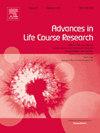Life course socioeconomic position and cognitive aging in later life: A scoping review
IF 3.4
2区 社会学
Q1 Medicine
引用次数: 0
Abstract
Background and Objectives
Low socioeconomic position (SEP) throughout the life course is related to poorer cognitive health in later life, but debate ensues on the life course models for this association. To advance inquiry on the topic, we conducted a scoping review.
Research Design and Methods
We examined the association between life course SEP and cognitive function in later life in observational studies—considering cognition both as a cross-sectional level and as a longitudinal trajectory across cognitive domains—and assessed whether the empirical evidence supported life course models. We focused on studies in the general population with cognition measured in the second half of life (45 +). Forty-two studies (21 datasets) were included representing 595,276 participants (201,375 across unique datasets) from 46 countries.
Results
For cognitive level, studies consistently found associations between SEP at various stages of the life course, both in overall cognition and across specific cognitive domains. These associations were generally robust to confounding and mediating factors. For cognitive trajectory, studies showed inconclusive associations with SEP across life course and across cognitive domains. Results supported the sensitive period, pathway, and accumulation models, but not the critical period model. Results supported that education acts as a pathway (and potential mediator) in the association between early-life SEP and later-life cognition.
Discussion and Implications
SEP throughout the life course has a robust association with later-life cognitive level, but not decline. Early-life cognitive enrichment for young people raised in socioeconomically disadvantaged households may reduce the SEP gap in cognitive functioning during later life.
生命历程、社会经济地位与晚年认知衰老:一个范围综述
背景和目的低社会经济地位(SEP)与晚年认知健康状况较差有关,但对这种关联的生命过程模型存在争议。为了推进对该主题的调查,我们进行了范围审查。研究设计和方法我们在观察性研究中考察了生命过程SEP与晚年认知功能之间的关系——将认知视为横截面水平和跨认知领域的纵向轨迹,并评估了经验证据是否支持生命过程模型。我们关注的是一般人群在后半生的认知能力(45 +)。42项研究(21个数据集)包括来自46个国家的595,276名参与者(201,375名不同数据集的参与者)。结果在认知水平上,研究一致发现SEP在生命历程的各个阶段之间存在关联,无论是在整体认知还是在特定认知领域。这些关联对于混淆和中介因素通常是稳健的。对于认知轨迹,研究显示SEP在生命历程和认知领域之间的关联不确定。结果支持敏感期、通路和积累模型,但不支持临界期模型。研究结果支持教育在早期SEP与后期认知之间发挥通路(和潜在中介)的作用。讨论与启示在整个生命过程中,sep与后期认知水平有显著的相关性,但与下降无关。在社会经济条件较差的家庭中长大的年轻人,其早期认知能力的增强可能会减少他们在以后生活中认知功能方面的差距。
本文章由计算机程序翻译,如有差异,请以英文原文为准。
求助全文
约1分钟内获得全文
求助全文
来源期刊

Advances in Life Course Research
SOCIAL SCIENCES, INTERDISCIPLINARY-
CiteScore
6.10
自引率
2.90%
发文量
41
期刊介绍:
Advances in Life Course Research publishes articles dealing with various aspects of the human life course. Seeing life course research as an essentially interdisciplinary field of study, it invites and welcomes contributions from anthropology, biosocial science, demography, epidemiology and statistics, gerontology, economics, management and organisation science, policy studies, psychology, research methodology and sociology. Original empirical analyses, theoretical contributions, methodological studies and reviews accessible to a broad set of readers are welcome.
 求助内容:
求助内容: 应助结果提醒方式:
应助结果提醒方式:


